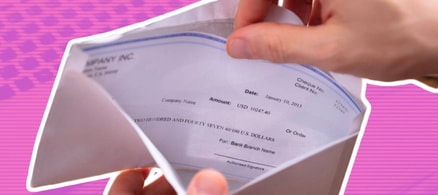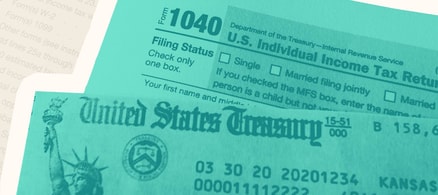First, let’s look at some red flags that can’t be avoided.
1. Making a lot of money
The stats don’t lie — the more money you make, the more likely an audit is coming your way.
“Despite common misperceptions about IRS examination rates, the reality is that the likelihood of an audit significantly increases as income grows,” says IRS Deputy Commissioner Sunita Lough.
That doesn’t mean low-income workers can coast during tax time, but just prepared for extra scrutiny with a higher income.
The IRS says typical audits for higher-income taxpayers involve at least three different tax years, and could take years to resolve. So if you’re in that group, take extra care when filing your taxes, and consider getting some help from tax experts.
Meet Your Retirement Goals Effortlessly
The road to retirement may seem long, but with WiserAdvisor, you can find a trusted partner to guide you every step of the way
WiserAdvisor matches you with vetted financial advisors that offer personalized advice to help you to make the right choices, invest wisely, and secure the retirement you've always dreamed of. Start planning early, and get your retirement mapped out today.
Get Started2. Running a business
This might seem unfair. If running a business wasn’t already difficult enough during the COVID-19 pandemic, now you have to worry about getting audited too.
But just ask any business owner about the paperwork involved — there are a few things you could miss when you do your taxes, so the IRS is going to bring its magnifying glass to your return.
Schedule C, the tax form that sole proprietors will fill out, has a ton of deductions for self-employed people. But the tax agency knows from experience that deductions can occasionally go overboard.
3. High itemized deductions
When you’re filing your taxes, you have two choices: Itemize your deductions and list them out one by one, or take the simplified standard deduction.
Deductions decrease your taxable income and help lower your tax bill, and after a 2017 tax law nearly doubled the standard deduction amounts, most U.S. households opt for that route.
But, some taxpayers have lots of legally allowable deductions for qualifying expenses, and will itemize them instead. A super-high itemized deduction will open some eyes down at the tax agency. Just make sure you have all your documentation on hand to support your tax return.
Stop overpaying for home insurance
Home insurance is an essential expense – one that can often be pricey. You can lower your monthly recurring expenses by finding a more economical alternative for home insurance.
SmartFinancial can help you do just that. SmartFinancial’s online marketplace of vetted home insurance providers allows you to quickly shop around for rates from the country’s top insurance companies, and ensure you’re paying the lowest price possible for your home insurance.
Explore better rates4. Large charitable donations
There are plenty of causes that need the help this year, and it doesn’t hurt that you can write-off that good deed, too.
But if your charitable donation is astonishingly high compared to your income, it’s a red flag for the IRS. The agency t knows what the average charitable donation is for each income level.
If your adjusted gross income is $75,000, the average yearly charitable donation is a bit higher than $3,000. If you donate, say $10,000 in a single year, expect a higher chance of you’ll hear from the IRS.
As part of this year’s new tax changes, the agency is actually making it easier to get your tax break for donations, with a write off up to $300 in cash contributions to charity, even if you take the standard deduction.
5. Dealing in cryptocurrency
If you’re into buying and selling Bitcoin and other digital currencies, the IRS wants to know.
In 2019, the agency began sending thousands of letters to cryptocurrency holders, warning them they may have broken federal tax laws.
The tax rules treat Bitcoin and other cryptocurrencies as property for tax purposes, and have published a set of FAQs to help you file properly.
6. Cash transactions
The tax man may come knocking simply because you work in a certain industry. Cash businesses, like restaurants, lawn care and laundromats, are more likely to be audited because of how difficult it is to verify income received in cash.
Try to document your business transactions as much as you can. If the IRS does come calling, they’ll want to confirm that your lifestyle is supported by your declared income.
Speaking of cash transactions, any business that receives more than $10,000 in cash in a single transaction has to send a form to the IRS. So, if you’re making it rain at pawn shops, car dealers or casinos, be prepared for some added scrutiny.
Next, these (likely) errors are also going to invite attention from the IRS. Here are six red flags that can be avoided.
7. Incorrectly reporting the health premium tax credit
If you can’t get affordable health coverage through your employer, and you’re not eligible for Medicare, Medicaid or other federal insurance, you could get a handy tax credit when you buy insurance through a marketplace like healthcare.gov.
You can choose to have the credit paid in advance to the insurance company to lower your monthly payments, and then complete the necessary paperwork when you file your taxes.
If you forget to report that subsidy, or you claim it even though you’re above the income threshold, you may get extra IRS attention.
It might help to shop around and compare rates from health insurance companies.
8. Failing to report a foreign bank account
If you’re an American taxpayer stashing some of your money outside the U.S., the tax man will eventually find out.
You're better off reporting your money before The IRS come looking. Failure to report your foreign bank account can lead to severe penalties.
Just make sure you file a Report of Foreign Bank and Financial Accounts (FBAR) by deadline day.
9. 100% business use of a vehicle
Business owners can list the depreciation of their car and the percentage of its business use for the year.
But claiming that 100% of the use of your vehicle is for business is a major red flag. Have you really never used that car for anything but business?
If you want to save extra cash on your car legitimately, check to see if you’re paying too much for insurance. If you haven’t shopped around for rates lately, you may be paying $1,100 more than you have to.
10. Claiming the home office deduction
It’s time to finally expense all those new home office products you bought last year, right?
Even though the pandemic forced more people than ever to work from home in 2020, most won’t be able to claim the home office deduction.
To save some money on those expenses, try a free browser extension to compare prices and ensure you’re getting the best deals.
Prior to 2018, some employees could write off home expenses if they went for itemized deductions. Now, the benefit is only available to self-employed people or independent contractors who use a space in their home exclusively for business.
Even if you are eligible for this write off, you need to calculate what percentage of your home was used for business, and the IRS will flag your return if that number looks suspicious to them.
11. Taking an early payout from retirement accounts
All that money you’re paying into your traditional IRA or 401(k)? Technically you don’t need to wait until you’re retired before you start withdrawing.
But if you do decide to make some withdrawals before the age of 59 1/2, there are some tax implications. You’ll pay a 10% penalty on top of regular income tax unless you qualify for an exemption, such as using your IRA to buy your first home.
The IRS is on the lookout for taxpayers who don’tt actually qualify for those exemptions.
Creating a strategy for your retirement accounts isn’t always simple. You may consider talking to a certified financial planner (CFP) who can help you make a personalized plan.
12. Non-filers
This might seem obvious: If you don’t even bother filing an income tax return, the IRS is going to raise an eyebrow.
But the IRS has been having a hard time keeping up with people who do not file tax returns — and it’s high-income non-filers causing the most trouble. The Treasury Inspector General for Tax Administration released a report in 2020 that highlights tax money being left on the table by not pursuing non-filer and set out recommendations to help the IRS to bridge that tax gap.
That means that even if you’re not a high-earner, the tax agency may take non-filers a bit more seriously this year.
If it’s your first time, check out our guide on filing your taxes. The process might be confusing at first, but getting audited is way more complicated.
Sponsored
Follow These Steps if you Want to Retire Early
Secure your financial future with a tailored plan to maximize investments, navigate taxes, and retire comfortably.
Zoe Financial is an online platform that can match you with a network of vetted fiduciary advisors who are evaluated based on their credentials, education, experience, and pricing. The best part? - there is no fee to find an advisor.







